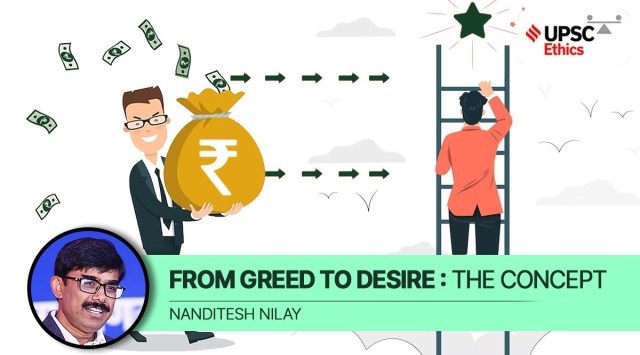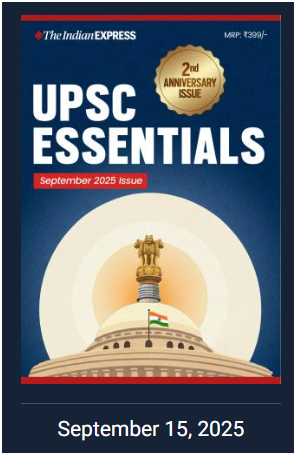© IE Online Media Services Pvt Ltd
Latest Comment
Post Comment
Read Comments
 Does the desire for better posting or remaining in the good books of the superior become more important than carrying the desired responsibilities? (Image: Abhishek Mitra)
Does the desire for better posting or remaining in the good books of the superior become more important than carrying the desired responsibilities? (Image: Abhishek Mitra) 🚨 This story is part of our special initiative for UPSC and other competitive exams. Look out for UPSC KEY on weekdays and UPSC Essentials everyday, Weekly news express with MCQs, Key Terms of the past week, Quizzes as well as The Indian Express 360° Upsc Debate, Society & Social Justice, UPSC Mains Practice, Art and Culture with Devdutt Pattanaik, UPSC Ethics Simplified, Experts Talk, and more. 🚨
Relevance: The topic is a part of UPSC CSE General Studies Paper-IV Ethics syllabus. Concepts are particularly relevant in the theory section. Aspirants will also find the article useful for their Essay paper and situation-based questions in personality tests. Moreover, the essence of the article will help aspirants in their professional lives or in life in general. Nanditesh Nilay writes for UPSC Ethics Simplified fortnightly on Sundays. The first article will be a concept while the second article will be a caselet based on the concept. Don’t miss the ‘points to ponder’ below.
Dear Aspirants,
Today, I want to talk to you about a topic I have been eagerly waiting to address since my association with you through UPSC Essentials of The Indian Express. I believe as a future bureaucrat and as a present responsible citizen, it is time we should discuss it. If you remember, last time I left you with a quote from Aristotle “I count him braver who overcomes his desires than him who overcomes his enemies.” Did you ponder on it?
Let me start today on a personal note. Writing an ethics article for you is not just a routine job. Ethics is not just definitional. I, with Manas Srivastava of The Indian Express, go through a brainstorming session to dive deep into the core of ethics and ethical concepts for the Ethics Simplified series. In the process, the attempt is to not just discuss the obvious but also go beyond and make genuine efforts to instill ethics in future civil servants of this great country. So, questioning ourselves is the first step of this important exercise and I suggest you the same.
When we last talked about greed, it was natural to address desires. Very frankly, let me first open to you my mind full of questions which will help me to explain the concept lucidly. In a world where greed overpowers the need then what about desires? Everyone has a desire to qualify for civil services. Isn’t it? But what about the desire for serving through service or what kind of desires gradually envelope us when we prepare for this exam or qualify? Does the desire for better posting or remaining in the good books of the superior become more important than carrying the desired responsibilities? Or desire to remain neutral in service become a common way of surviving in bureaucracy? Or desire to serve with honesty, integrity, and empathy to the last person is the ultimate desire for aspirants before and after qualifying for the exam? One will have to keep that moral lens open and enlightened.
The world of desire most of the time becomes dangerous if it gets attached with greed. Greed is raw and a child-state phenomenon but when it eclipses adulthood, most of the time gets packaged with desire, and life goes on.
Therefore, the above statement conveys that it is much more significant as well as challenging to control one’s desires as compared to subduing external enemies. It also highlights the fact that the effect of our unbridled desires (which are the real enemies) proves to be more inimical or harmful to us than the hostile acts of others. It presents a greater challenge and needs more bravery because one will have to fight with oneself. It needs great moral strength to tame one’s desires. Due to this reason, in ancient scriptures, highly evolved people or those with high moral character are referred to as ‘Arihant’ i.e. the ‘destroyers of real enemies’.
The above statement by Aristotle is a strong exhortation towards the need for controlling one’s spurious and negative desires and thus developing one’s moral strength to be successful in life. And courage is not the absence of fear but recognising the darkness and still moving towards the cause ceaselessly. That sense comes with a moral mindset that can overcome the negative edges of desire, and that never happens in a day.
This paper is not presented for only qualifying purpose. That has to be understood well. Those students who will carry the desire to qualify for that bigger cause in life will simultaneously find the courage to assess their decision ethically.
With this piece, I will expect to see aspirants getting absorbed in explaining what is meant by ‘controlling the desires’ or ‘overcoming the desires’. To identify those good and bad desires; why do some desires appear to be ever-growing and not-satiating? In this process, they need to identify the desires that are conducive to sustainable and collective human happiness and those that lead to the exploitation of others and in the long run, misery to oneself.
Even before getting into a case study, it will be wise to exemplify from real-life situations the negative consequences of uncontrolled desires. There will be major difficulties in controlling one’s desires. What can be those challenges? This will mark the proper presence of rational or moral intent. Desire to define the state of desire with a keen eye on desire must be the right desire. The desire to qualify is beginning but the desire to listen to the last person is desired, and i.e. Civil Service.
Best Wishes,
Nanditesh
Point to ponder:
What is the difference between desire and greed? Having desires is good or bad?
Share your views, answers and suggestions in the comment box or at manas.srivastava@indianexpress.com
(Nanditesh Nilay is the author of ‘Being Good and Aaiye, Insaan Banaen’ and ‘Ethikos: Stories Searching Happiness’. He teaches courses on and offers training in ethics, values and behaviour. He has been the expert/consultant to UPSC, SAARC countries, Civil services Academy, National Centre for Good Governance, Central Bureau of Investigation (CBI), Competition Commission of India (CCI), etc. He has PhD in two disciplines and has been a Doctoral Fellow in Gandhian Studies from ICSSR. His second PhD is from IIT Delhi on Ethical Decision Making among Indian Bureaucrats. He writes for the UPSC Ethics Simplified (Concepts and Caselets) fortnightly.)
https://www.youtube.com/watch?v=AfvCD51T5lU?si=3f-zyittLHHFgn43&w=560&h=315

Read UPSC Magazine


